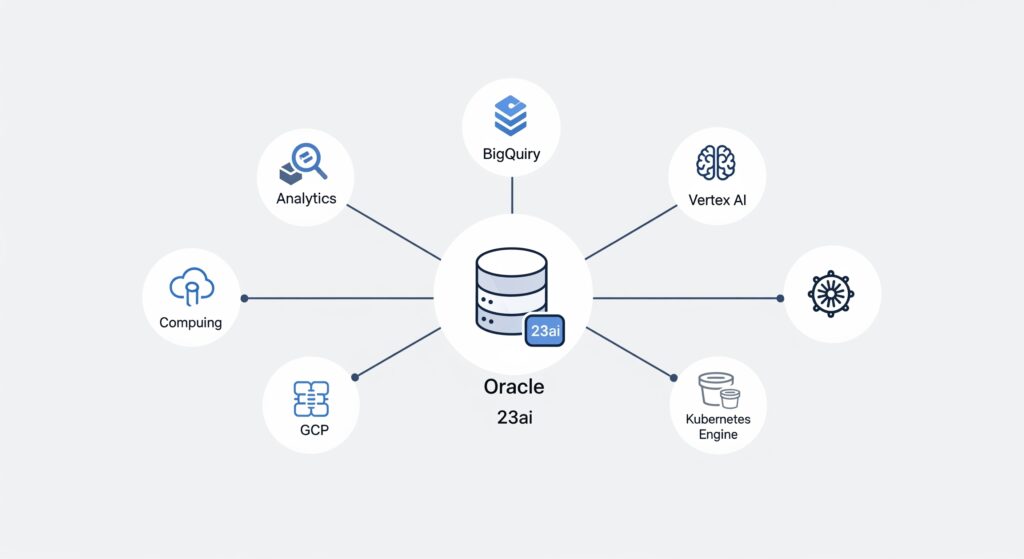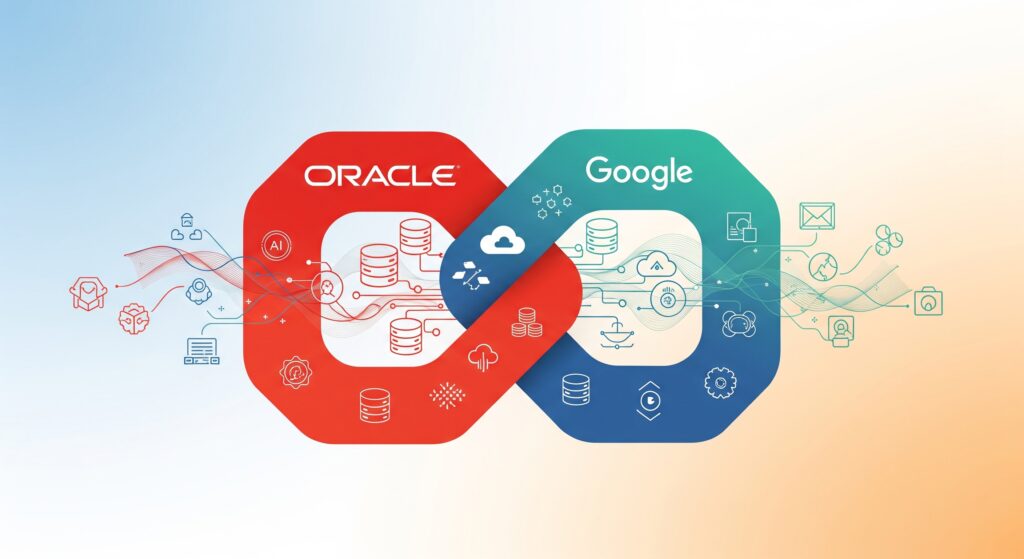Oracle to GCP Migration: Oracle@GCP vs. Cloud SQL – The Strategic Choice That Drives Results
The partnership between Oracle and Google Cloud represents one of the most significant collaborative achievements in enterprise technology. Oracle Database@Google Cloud Platform brings together Oracle’s proven database excellence with Google Cloud’s industry-leading infrastructure and AI capabilities, creating unprecedented opportunities for enterprise digital transformation.
This strategic alliance enables organizations to leverage Oracle’s advanced database technologies – including Oracle Database 23ai with its revolutionary AI features – while gaining full access to Google Cloud’s comprehensive service portfolio including BigQuery, Vertex AI, and Kubernetes Engine. The result is a unified platform that eliminates the traditional trade-offs between database capability and cloud innovation.
As a someone who has led multiple enterprise Oracle migrations and working closely with Google Cloud’s enterprise sales team, we’ve witnessed this partnership deliver exceptional results for organizations seeking to modernize their data infrastructure. While Google Cloud SQL platforms offer solid managed database services for many use cases, Oracle@GCP provides enterprise-grade capabilities that drive competitive advantage and long-term strategic value.
Two Paths, One Clear Winner
We recently collaborated on evaluating two distinct migration architectures for a client modernizing their Oracle infrastructure on Google Cloud Platform. The contrast illuminated fundamental differences that every IT leader should understand.
Path 1: Migration to Google Cloud SQL – A Viable Alternative
Google Cloud SQL provides excellent managed database services with PostgreSQL, MySQL, and SQL Server options. These platforms offer strong operational benefits including automated backups, security patching, and high availability configurations. For organizations with simpler database requirements or those looking to standardize on open-source technologies, Cloud SQL represents a solid foundation for cloud operations.
However, organizations with complex Oracle workloads may find that Cloud SQL requires additional planning for feature compatibility, performance optimization, and application integration considerations.
Path 2: Oracle@GCP with Oracle Database 23ai – The Enterprise Excellence Platform
Oracle@GCP deploys Oracle Database through Oracle’s cloud infrastructure services directly within Google Cloud Platform. This architecture provides seamless integration with Google Cloud services while maintaining Oracle’s advanced database capabilities, delivering transformation rather than mere platform conversion.
The business case extends beyond technical considerations – it’s about maintaining competitive advantage while achieving cloud benefits.
The Oracle 19c Support Reality: A Ticking Clock
Based on Oracle’s official Lifetime Support Policy (effective June 10, 2025), Oracle 19c presents significant timeline constraints that both technical and sales perspectives must address:
- Premier Support ends December 2029 – Only four years of full support remaining from today
- Extended Support ends December 2032 – Seven-year limited runway with restrictions
- Java 8 support exclusion after December 2030 – Critical limitation for enterprise environments running integrated Java components
Compare this to Oracle 21c (Innovation Release), which offers Premier Support only until July 2027 with no Extended Support available. The pattern is clear: investing in any Oracle release except 23ai means planning replacement before achieving full ROI.Our joint analysis shows that organizations choosing Oracle 19c today will face another migration decision within 3-4 years – creating compounded migration costs and technical debt accumulation.
Oracle Database 23ai: Purpose-Built for AI-Powered Enterprise Success

Oracle Database 23ai delivers over 300 enterprise-grade features designed for competitive differentiation. From our combined technical and sales perspective, these transformational capabilities drive measurable business outcomes:
- AI Vector Search integrates semantic search across documents, images, and unstructured data with your private business information – no data movement required, maintaining security while unlocking insights that Google Cloud SQL platforms cannot match.
- JSON Relational Duality eliminates the traditional document versus relational trade-off by providing unified access through both SQL and JSON APIs, surpassing the capabilities of standard PostgreSQL or MySQL JSON handling.
- Model Context Protocol (MCP) Integration enables direct AI assistant integration with built-in security, allowing agents to generate and execute SQL queries while maintaining enterprise governance – functionality unavailable in Google Cloud SQL managed services.
- Oracle True Cache delivers automatically managed, in-memory SQL and key-value caching that accelerates application performance beyond what Cloud SQL memory configurations can achieve.
These aren’t incremental improvements – they’re foundational capabilities that position organizations for the next decade of data-driven competition within Google Cloud’s ecosystem.
Why Oracle@GCP Wins the Total Cost Analysis
Our comprehensive migration assessment reveals the hidden costs of Oracle-to-Cloud SQL conversion that impact bottom-line results:
The 80/20 Reality of Database Migration
While basic table structures may convert between platforms, they represent only 15-20% of total migration effort. The remaining 80% includes:
- PL/SQL to stored procedure conversion (60% of effort) – Complete rewriting for PostgreSQL functions or MySQL procedures
- Application integration changes (20% of effort) – ORM modifications, connection handling, query syntax adjustments
- Advanced feature reimplementation (10% of effort) – Partitioning, triggers, and constraints require platform-specific approaches
- Performance optimization (10% of effort) – Completely different tuning methodologies and capabilities
Hidden Considerations for Cloud SQL Migration
While Google Cloud SQL migration is certainly achievable, organizations should plan for several implementation aspects:
- Feature adaptation: Some Oracle-specific functionality may require alternative approaches in PostgreSQL, MySQL, or SQL Server environments
- Application integration updates: Connection handling, query optimization, and ORM configurations may need adjustment for different database engines
- Performance tuning methodology: Each Cloud SQL platform has unique optimization approaches that teams will need to master
- Operational procedures: Database administration practices will require updates for the new platform environments
Oracle@GCP Advantage Through Partnership
Our clients achieve immediate ROI through preserved investments:
- Zero application rewrite – Existing PL/SQL code base remains fully functional
- Retained expertise – Current Oracle DBA skills continue delivering value
- Maintained performance characteristics – No unknown optimization requirements across multiple platforms
- Preserved advanced features – Partitioning, advanced analytics, and enterprise security remain intact
Strategic Positioning for Long-Term Success
Oracle@GCP provides the enterprise foundation your organization needs for sustained competitive advantage within Google Cloud’s ecosystem:
- Google Cloud Integration Excellence – Oracle’s infrastructure services enable seamless connectivity to BigQuery for analytics, AI Platform for machine learning, Kubernetes Engine for containerization, and Vertex AI for advanced AI/ML workloads while maintaining Oracle’s database excellence.
- AI-Driven Competitive Advantage – Oracle’s built-in AI capabilities complement Google Cloud’s machine learning and analytics services, positioning organizations at the forefront of data-driven decision making.
- Performance Scalability – Enterprise-grade database performance that surpasses Cloud SQL limitations, particularly for complex analytical workloads and high-concurrency applications that leverage Google Cloud’s compute infrastructure.
- Operational Excellence – Unified database management with transparent pricing eliminates the complexity of managing multiple Cloud SQL instances for different workload types.
The Partnership Perspective: Technical Leadership Meets Sales Excellence
From the RheoData View: Oracle@GCP eliminates the technical risks associated with platform conversion while providing immediate access to Google Cloud’s innovation ecosystem. Your team maintains their Oracle expertise while gaining access to best-in-class cloud services.
From the Google Cloud Sales Perspective: Oracle@GCP accelerates customer success on Google Cloud Platform by eliminating migration blockers and reducing project risk. Customers achieve faster time-to-value and higher platform adoption rates when database complexity is removed from the equation.
Combined Value: This partnership approach ensures both technical success and business objectives align, creating sustainable competitive advantage through proven technology integration.
Our Joint Recommendation
The data tells a compelling story: Oracle 19c represents a short-term fix when your organization requires long-term strategic advantage. With only four years of Premier Support remaining and Java 8 limitations creating operational constraints, this path misaligns with sustainable operational excellence.
Oracle Database 23ai via Oracle@GCP delivers the platform foundation necessary for competitive differentiation over the next 5-10 years. This approach provides true digital transformation – not just database conversion – positioning your organization for sustained success in an AI-powered marketplace while maximizing Google Cloud Platform investments.
The Bottom Line for Executive Decision-Making
When evaluating Oracle migration options within Google Cloud Platform, consider this strategic question: Does your organization want to invest in a complex multi-platform conversion requiring extensive reengineering, or maintain proven database excellence while gaining cloud benefits?
Google Cloud SQL platforms serve specific use cases well, but they cannot match Oracle Database’s enterprise capabilities, advanced analytics features, or AI integration potential. Organizations with significant Oracle investments achieve better ROI by leveraging Oracle@GCP rather than pursuing costly platform conversions.
We recommend proceeding with an Oracle@GCP proof of concept to validate performance characteristics and integration capabilities with your specific Google Cloud services. This strategic approach balances innovation with risk management while maintaining business continuity and maximizing both Oracle and GCP investment returns.
Contact RheoData at [email protected] to discuss how Oracle@GCP can accelerate your organization’s Google Cloud adoption while eliminating the risks and costs associated with heterogeneous database conversion.



